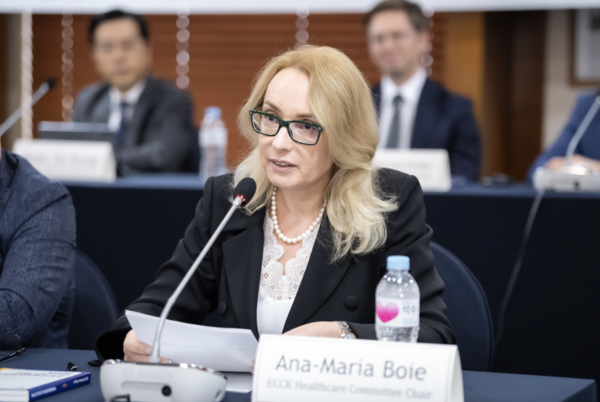“The ECCK’s pharmaceutical and medical device working group will continue to work with the Korean government to address market access concerns and enhance regulatory cooperation.”
Ana-Maria Boie, chairperson of the European Chamber of Commerce in Korea (ECCK) Healthcare Committee, said so during a news conference on Thursday.
Unveiling the 2024 white paper outlining European companies' views on Korea’s regulatory landscape, Boie, who also serves as general manager of Boehringer Ingelheim Korea, pointed to hurdles facing European healthcare businesses operating in Korea.
“Despite shared accomplishments, the European healthcare industry faces challenges in transparency, predictability, and fairness,” she said, emphasizing that these issues are not merely bureaucratic obstacles but are preventing life-saving treatments from reaching Korean patients and deterring potential investors.

“Korea’s pricing policies also don’t fully recognize the value of innovative treatments,” Boie pointed out. The reliance on conservative assumptions about clinical benefits, she said, has created a “significant gap in the investment climate.”
The ECCK white paper reinforced these concerns, stating that Korea’s pricing structure prioritizes the budget impact on the National Health Insurance Service (NHIS) over the proper evaluation of innovative treatments. It also called for Korea’s Health Insurance Review and Assessment Service (HIRA) to adopt a more flexible approach, criticizing its adherence to conservative assumptions and its reluctance to adjust cost-effectiveness thresholds for treatments addressing specific diseases. This approach, the report noted, results in undervaluing new drugs, particularly those with multiple indications, where not all therapeutic benefits are fully recognized.
Despite Korea’s push for foreign direct investment, the ECCK Healthcare Committee noted that multinational healthcare companies find the competitive landscape uneven, potentially leading them to reconsider their investments. This could result in delayed access to new treatments for Korean patients. “Addressing these issues could enhance the attractiveness of Korea as a destination for investment in innovative healthcare,” Boie said.
The medical device and in vitro diagnostic sectors are also feeling the pressure. The government favors “expanding the domestic market for domestic products” over the rapid introduction of innovative technologies by foreign companies, which, according to the ECCK Healthcare Committee, creates an “unfair competitive market environment.” The committee emphasized in their report the need to recognize a broader range of clinical improvements when evaluating new drugs beyond survival rates.
It also recommended that evaluations consider factors beyond cost-effectiveness, such as social demand and disease severity. The report states, “Implementing indication-based pricing tailored to the specific characteristics of the disease and the drug's clinical value is essential for fair evaluations.”
According to the ECCK, Korea's complex post-management systems for drug pricing are another factor undermining transparency and predictability in decision-making.
Boie warned that “multiple drug price reductions in Korea could disrupt supply and hinder new drug listings. This instability disrupts supply plans for innovative drugs. It could raise entry barriers for future treatments by driving down the competitor's price, increasing the likelihood of “Korea-passing,” where companies bypass the market entirely.
Boie “appreciates the Health and Welfare Ministry’s efforts to evaluate drug values” but stressed that for industry-impacting measures like IRP—where foreign drug price comparisons involve many variables—"enhancing transparency and predictability as discussed in the Korea FTA is crucial."
As a member of the Pharmaceutical Inspection Convention and Pharmaceutical Inspection Cooperation Scheme (PIC/S), Korea maintains high-quality standards, further validated by its emergence as a key biopharmaceutical manufacturing hub during the Covid-19 pandemic. However, ECCK’s Healthcare Committee has called for improvements in redundant Good Manufacturing Practice (GMP) evaluations and quality control tests, particularly for biological products like vaccines.
“It’s important to promote a mutual recognition agreement between the EU and Korea to fully recognize GMP evaluations to avoid duplicate tests of biological products and ensure efficiency,” Boie said.
“Addressing these challenges is imperative for Korean patients to access innovative treatments and for Korea to remain an attractive destination for European investments,” Boie said.
The ECCK also reported that 37 percent of the 114 recommendations presented in the 2023 white paper received positive feedback from the relevant government departments after discussions with KOTRA's Foreign Investment Ombudsman.

